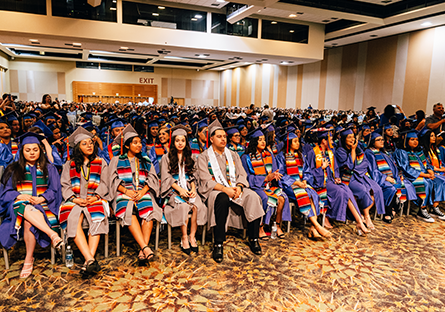
Maricopa Community Colleges is proud to celebrate National Hispanic-Serving Institutions (HSIs) Week from September 9-15. Organized by the Hispanic Association of Colleges and Universities (HACU), the weeklong observance highlights the critical role HSIs play in expanding access to higher education for traditionally underserved students. Last year marked a notable milestone for the system, as all 10 colleges were recognized as HSIs.
“Thirty-eight percent of our student population identifies as Hispanic,” said Dr. Steven R. Gonzales, Chancellor of Maricopa Community Colleges. “By 2030, Latinos will represent 22% of the U.S. workforce. As a Hispanic-serving district, it is our responsibility to remove barriers so that Hispanic and Latino students can not only succeed in college but gain the skills needed to build long-lasting, rewarding careers.”
Why It Matters:
Arizona, one of 13 states with over 1 million Hispanic residents, has the fifth-largest Latino population in the U.S. In 2023, 17% of Hispanics, ages 18-34, were enrolled in higher education, and 24% of Hispanic adults, 25 years or older, had earned an associate degree or higher. During the 2022-23 academic year, Maricopa Community Colleges’ Hispanic/Latino student headcount exceeded that of all three in-state universities combined. Today, the system is enrolling more Hispanic students, with 2023-24 academic year enrollment data showing nearly 55,000 students enrolled, marking a 5.6% increase from the previous academic year.
Celebrating HSIs at Maricopa Community Colleges
- Thanks to the Title V grant, ¡Éxito! Podemos Imaginar Contigo, Chandler-Gilbert Community College (CGCC) launched its first Spanish landing page this January to better serve Hispanic students and their families.
- Estrella Mountain Community College (EMCC) hosted the inaugural AZ HSI Summit in 2022, in which President Dr. Rey Rivera co-founded the AZ HSI Consortium. The event showcased evidence-based practices that effectively and intentionally support Latinx students and build capacity among faculty and staff to teach and lead at HSIs.
- In 2009, GateWay Community College (GWCC) was designated an HSI. Today, the college is richly diverse, with 50% of its student population identifying as Hispanic. Since 2020, the college has celebrated HSI week by interviewing students, faculty, and staff and hosting culturally-focused workshops.
- In 2021, Glendale Community College (GCC) received a $4.05 million Title III STEM-focused grant. To date, the five-year grant has focused on pathway progression, student transformation, and academic innovation, contributing to improved student success in STEM fields.
- The HSI-STEM Grant Internship at Mesa Community College (MCC) aims to increase the number of Hispanic students attaining degrees in STEM fields. As part of the internship, students gain firsthand experience to help build their resume and establish a professional network of mentors and industry contacts.
- Paradise Valley Community College (PVCC), designated an HSI in 2021, was recognized by the ALL IN Campus Democracy Challenge for boosting student voter engagement, winning the Best in Class Award for Most Improved Voting Rate at an HSI. Additionally, to celebrate Hispanic Heritage Month, PVCC has compiled a list of local businesses, books, artists, and music recommendations and will host several events.
- Last fall, Phoenix College (PC) was one of nine recipients of the Excelencia in Education’s Seal of Excelencia Certification, which recognizes higher education institutions that empower Latino/a/x students to succeed.
- Rio Salado College’s (RSC) Avanzar Project is funded through the Developing Hispanic-Serving Institutions Title V grant. The $2.9 million grant will run through 2027 and support attainment by connecting students with resources like co-curricular programs and academic life coaching.
- Scottsdale Community College (SCC) was the final college within the system to earn the HSI designation in 2023, with 29% of the student population self-identifying as Hispanic. This month, the college will honor National Hispanic Heritage Month with crafts, food, musical performances, and interactive workshops. Click here for a schedule of events.
- South Mountain Community College (SMCC) has seen the rebirth and expansion of its new Career Services department, which was funded by a Department of Education Title V Grant: Developing Hispanic-Serving Institutions. With nearly 60% of SMCC's student population identifying as Hispanic, this effort is key to assisting students prepare for and find gainful employment not only after graduation but during their time in college.
Culturally Focused Programs
In 2022, HSI EXCELlence received a $1.85 million grant from the Helios Education Foundation to improve Latino student success. HSI EXCELlence connects first-generation Latino/a/x students, including DACA and undocumented students, to vital resources that help them navigate college and succeed. At its core, the program is centered around six key elements–cariño (care), comunidad (community), familia (family), flexibilidad (flexibility), direct outreach, and support. HSI EXCELlence is available at six of the 10 HSI colleges: EMCC, GWCC, GCC, MCC, PC, and SMCC.
English as a Second Language (ESL) programs can help adults learn English, improve their speaking and writing skills, and gain confidence with non-credit and credit ESL classes and free drop-in conversational circles.
The HSI designation is awarded to colleges and universities with 25% or more of the total undergraduate enrollment of Hispanic and Latino/a/x/ students. Having the HSIs designation provides opportunities for the system and colleges to apply for grants and receive additional federal funding that directly supports the academic needs of new majority learners.
Learn more at maricopa.edu.